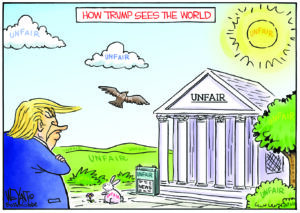Joe Conason: For a Real Change in Iraq, Negotiate
What deserves far greater attention in the Iraq Study Group report is its conclusion that there is no military solution to the American dilemma in Iraq, and that the only way out is negotiation.Before the publication of the Iraq Study Group report, predictions abounded that the committee, chaired by James Baker III and Lee Hamilton, would offer little new and nothing radical. Bipartisan mush in soft covers seemed the most likely product of any Washington group whose first imperative was unanimity.
Yet the former secretary of state, the retired Indiana congressman and their colleagues exceeded those expectations. Bland as their language is, they assessed the overall failure of the Bush administration’s foreign policy in the Middle East, from the president’s abandonment of the Arab-Israeli peace process to his distraction from securing Afghanistan. And they urged him, in the strongest terms, to adopt a new policy of engagement with adversaries in Syria and Iran.
That emphasis on diplomacy became the focus of media coverage — along with the report’s rejection of both immediate redeployment of American troops and indefinite commitment to their presence in Iraq. What deserved far greater attention, however, was the most important of the Baker-Hamilton committee’s conclusions: namely, that there is no military solution to the American dilemma in Iraq, and that the only way out is negotiation. In the report, most references to this reality appear under the euphemistic category known as “national reconciliation.”
Its recommendations on security and military forces, for example, begin with a clear admonition: “There is no action the American military can take that, by itself, can bring about success in Iraq.” Which is obvious enough, except to a few politicians and commentators urging an impossible escalation of tens of thousands of troops. Then the same section goes on to urge the Iraqi government — as the report repeatedly does throughout its 100 pages — to “accelerate the urgently needed national reconciliation program to which it has already committed.”
In other words, any changes in military policy are ancillary to negotiations among the warring factions (and their foreign sponsors). Actually, the report is quite explicit in demanding that the authorities in Baghdad and Washington sit down with their armed opponents to talk about every relevant issue — including the date for the withdrawal of American troops.
Outlining the steps that the Bush administration can take to assist in reconciliation, the report recommends open negotiations on the presence of American forces. Although the committee members oppose setting any timetables or deadlines for withdrawal, they acknowledge that the insurgents must be convinced that a “successful national reconciliation dialogue will advance that departure date.” Recommendation 34 deserves to be quoted in full: “The question of the future US force presence must be on the table for discussion as the national reconciliation dialogue takes place. Its inclusion will increase the likelihood of participation by insurgents and militia leaders, and thereby increase the possibilities for success.”
As the report goes on to explain: “Violence cannot end unless dialogue begins, and the dialogue must involve those who wield power, not simply those who hold political office. The United States must try to talk directly to Grand Ayatollah Sistani [the most revered Shiite leader] . . . . The United States must also try to talk directly to Moqtada al-Sadr [the Mahdi Army warlord], to militia leaders, and to [Sunni] insurgent leaders.”
The significant word in that paragraph is not “should” but “must” — and the same imperative is used to urge the United States and the Iraqi government to support amnesty for the insurgents. “Despite being politically unpopular,” the report acknowledges, “amnesty is essential if progress is to take place. Iraqi leaders need to be certain that they have US support as they move forward with this critical element of national reconciliation.”
Equally critical to the advancement of negotiations — with both the internal enemies of the Iraqi government and neighboring states — is a plain statement by President Bush that the United States has no plans for permanent military bases in Iraq and no desire to control its oil resources. The ambitions once cherished by neoconservatives must be explicitly abandoned.
Whether this plan can accomplish broad pacification and the eventual disarming of the militias and insurgents, as envisioned by the Iraq Study Group, is subject to doubt. The appalling and senseless attacks on innocent civilians that occur every day do not encourage hope. But the time has come to insist on realistic measures that will permit most of our troops to come home within the coming year. Unless the president understands that he must pursue negotiation and amnesty rather than an illusory victory, his promised “change of course” will only be more of the same, and worse.
Joe Conason writes for The New York Observer (www.observer.com). To find out more about Joe Conason, visit the Creators Syndicate website at www.creators.com.
Copyright 2006 Creators Syndicate Inc.
Your support matters…Independent journalism is under threat and overshadowed by heavily funded mainstream media.
You can help level the playing field. Become a member.
Your tax-deductible contribution keeps us digging beneath the headlines to give you thought-provoking, investigative reporting and analysis that unearths what's really happening- without compromise.
Give today to support our courageous, independent journalists.






You need to be a supporter to comment.
There are currently no responses to this article.
Be the first to respond.